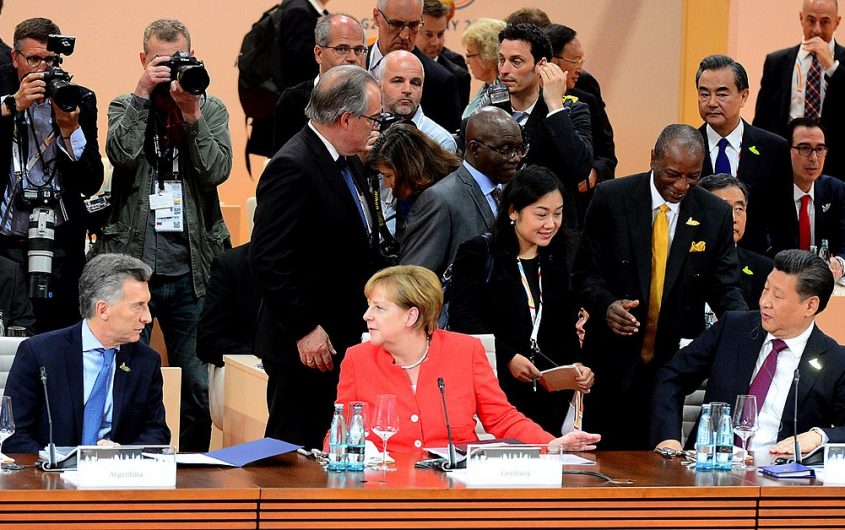
Casa Rosada via Wikimedia Commons
Keep Neutral and Carry On: The European Union’s Continuing Search for a China Policy

Yixiang Xu
China Fellow; Program Officer, Geoeconomics
Yixiang Xu is the China Fellow and Program Officer, Geoeconomics at AGI, leading the Institute’s work on U.S. and German relations with China. He has written extensively on Sino-EU and Sino-German relations, transatlantic cooperation on China policy, Sino-U.S. great power competition, China's Belt-and-Road Initiative and its implications for Germany and the U.S., Chinese engagement in Central and Eastern Europe, foreign investment screening, EU and U.S. strategies for global infrastructure investment, 5G supply chain and infrastructure security, and the future of Artificial Intelligence. His written contributions have been published by institutes including The Chinese Academy of Social Sciences, The United States Institute of Peace, and The Asia Society's Center for U.S.-China Relations. He has spoken on China's role in transatlantic relations at various seminars and international conferences in China, Germany, and the U.S.
Mr. Xu received his MA in International Political Economy from The Josef Korbel School of International Studies at The University of Denver and his BA in Linguistics and Classics from The University of Pittsburgh. He is an alumnus of the Bucerius Summer School on Global Governance, the Global Bridges European-American Young Leaders Conference, and the Brussels Forum's Young Professionals Summit. Mr. Xu also studied in China, Germany, Israel, Italy, and the UK and speaks Mandarin Chinese, German, and Russian.
__
The June 22 EU-China Summit ended without a joint statement. Although both sides stressed the importance of cooperation, the EU is clearly dissatisfied with the state of bilateral relations. The European Commission and the European Council’s subsequent joint press release compiled a laundry list of China’s unfulfilled commitments as well as European concerns for human rights in China and the new national security law in Hong Kong. It is widely believed that the lack of progress on the EU’s priorities, including negotiations over the EU-China Comprehensive Investment Agreement, EU-China partnership in Africa, and China’s climate change pledge, drove the EU to postpone the planned EU-China Summit in Leipzig this September.
Despite the stagnation, the EU still hopes to push on with bilateral cooperation. Earlier in the month, EU High Representative for Foreign Affairs Josep Borrell called for a “big, positive agenda for EU-China cooperation.” But what is the EU’s agenda on China? The EU-China 2020 Strategic Agenda for Cooperation covers everything from trade and investment to technology innovation to space exploration. It is an ambitious wish list. However, not only does the EU have limited authority over the bloc’s foreign policy aside from trade and investment issues, member states are divided on their positions toward Beijing. Germany leads Europe’s appeasement policy toward China, taking great care to cultivate its special relationship with the Middle Kingdom in order to preserve its economic interest. Sweden, whose bilateral relations with Beijing have remained icy since the abduction and later imprisonment of its citizen Gui Minhai by mainland Chinese authorities, asked the EU to consider sanctioning Beijing over its new national security law for Hong Kong. Meanwhile, member states often point fingers at each other for succumbing to Chinese influence and undermining European cohesion.
Germany leads Europe’s appeasement policy toward China, taking great care to cultivate its special relationship with the Middle Kingdom in order to preserve its economic interest.
In a strategic outlook document published in March 2019, the EU labeled China a “systemic rival promoting alternative models of governance.” Borrell insisted the bloc should defend its own values but ruled out sanctions against Beijing’s tightening grip on Hong Kong. European Commission president Ursula von der Leyen and European Council president Charles Michel reportedly raised human rights concerns in Xinjiang and Tibet during the June 22 videoconference. But Chinese official reporting did not acknowledge any of the EU’s value agenda. The EU even allegedly softened language in a recent report on coronavirus pandemic disinformation in Europe after being pressured by Chinese officials. Clearly, in the contest between systemic rivals, EU tactics toward China lack teeth.
The more fundamental reason for Europe’s kid-glove approach is the desire to continue to benefit from the extensive EU-China economic relationship. Although the EU now sees China as an economic competitor, the Chinese market remains highly attractive for European businesses. After years of lamenting the lack of market access and reciprocal treatment and forced technology transfer, European companies, especially large German companies, are doubling down on R&D investment in China.
European naiveté toward China may be over, but the EU does not wish to rock the boat. Even as Europe moves to build up foreign investment screening mechanisms to guard against Chinese strategic acquisition of European technologies and critical assets, many European governments, including Germany, have resisted U.S. calls to ban Chinese telecommunications Huawei from their 5G networks. Security, privacy, and fair competition are among the top concerns in Europe, but following Washington down a path of U.S.-style decoupling with China is the last thing Brussels wants.
And the EU is determined to avoid picking sides in the escalating U.S.-China conflict. Borrell claimed in a recent post that the EU will not ally with the U.S. to counter China, but will chart its own course. And he is hardly the only politician in Europe arguing for equidistance between Washington and Beijing. Notwithstanding frictions in the transatlantic relationship, Brussels’ choice to distance itself from its biggest democratic ally who shares much of Europe’s grievances toward China seems counterproductive and completely misses the EU’s own assessment on its relationship with Beijing—it has taken on a security and geopolitical dimension.
Brussels’ choice to distance itself from its biggest democratic ally who shares much of Europe’s grievances toward China seems counterproductive and completely misses the EU’s own assessment on its relationship with Beijing.
China already counts on the EU to remain neutral. A recent commentary in the Chinese Communist Party’s (CCP) foreign affairs mouthpiece Global Times prescribes neutrality and patient diplomacy as the only plausible course for the EU. Yet dialogues with China have not yielded compromises from Beijing and staying on course would not earn Brussels more leverage. Meanwhile, Beijing increasingly sets the tone for bilateral relations, promising sweeping partnership while unleashing aggressive “wolf warrior” diplomacy with impunity. Brussels may have invented the frenemy analogy for Sino-EU relations, but Beijing is far shrewder at practicing the double track approach. The EU’s reluctance is also pushing an already EU-skeptic American administration to adopt more unilateral measures, such as export control against China, that inevitably impact European business interests. Without strong U.S. backing, the EU’s call for China to honor rules and reciprocity could fall on deaf ears.
Perhaps realizing the inadequacy in its current approach to China, the EU seems to be trying something new. The conclusion of the latest bilateral EU-China summit without a joint statement is a sign that Brussels is more open with its displeasure of stagnating diplomacy with Beijing. The EU has moved to tighten the screws on foreign subsidies in the European single market and started to target Chinese subsidies in third countries. Borrell even proposed a bilateral dialogue with the U.S. to deal with China’s “growing assertiveness.” But how far the EU and its member states will go to defend their interests and values while juggling China as both a partner and rival remains to be seen. For now, Brussels will keep neutral and carry on.








